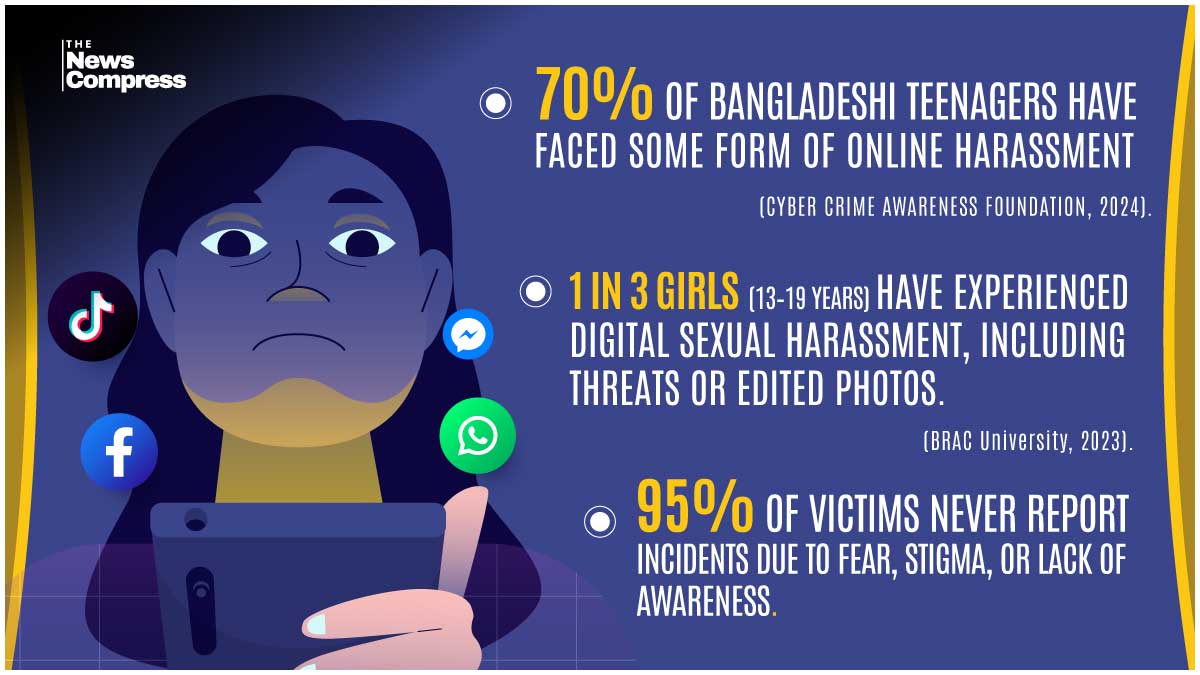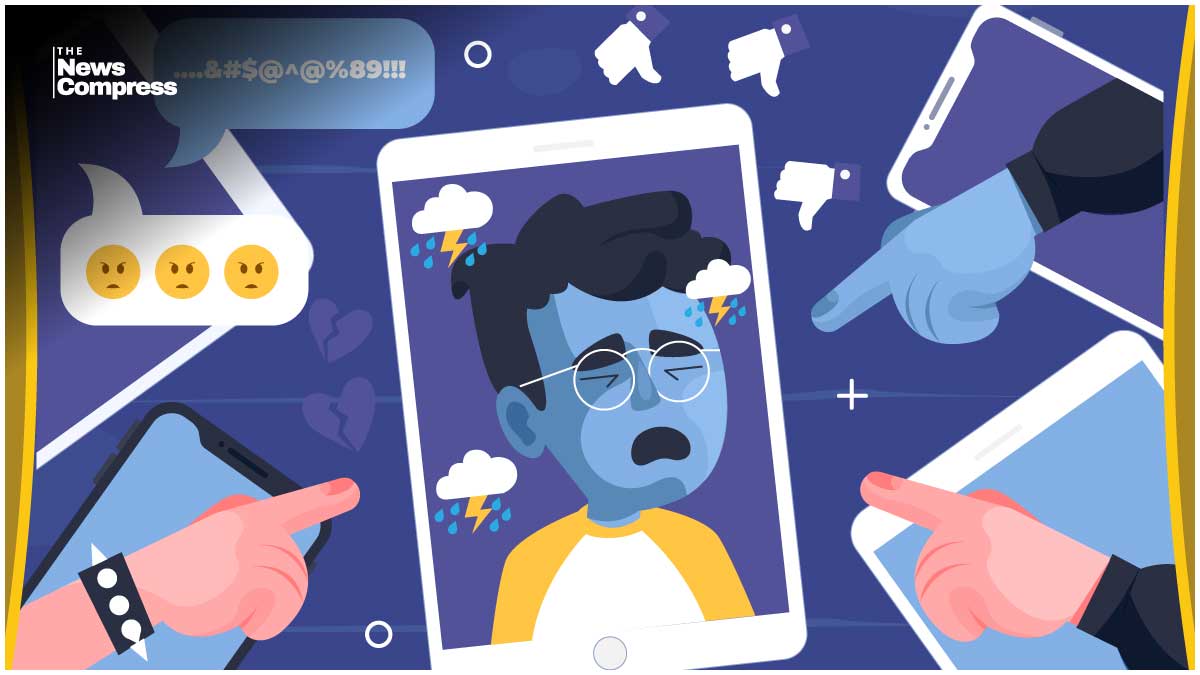Published: October 5, 2025, 08:08 PM
In Bangladesh, where nearly 70% of teenagers face online harassment, cyberbullying has become a silent epidemic. Behind every glowing screen lies unseen pain, words that wound like physical blows, victims silenced by fear, and a digital world where empathy is fading faster than connection.

Illustration: The News Compress
The internet was once a window to the world, a space where I could learn, connect, and express myself. But one afternoon in seventh grade, that window turned into a mirror reflecting cruelty. My Facebook inbox filled with hateful comments about my appearance, my voice, and even my confidence. Some came from strangers, others from classmates I once trusted. I refreshed the screen again and again, hoping they would disappear. They didn’t. I closed the app, but their words stayed in my head for weeks.
That was my first encounter with cyberbullying. I was thirteen, confused, and scared.
In Bangladesh today, this story is not rare. The Cyber Crime Awareness Foundation reported in 2024 that nearly 70 percent of Bangladeshi teenagers have faced some form of online harassment. Many of them are girls, and most suffer in silence. Behind every bright screen, there are untold stories of fear, shame, and mental exhaustion.
A close friend of mine, an extraordinary poet, uploaded a video reciting a feminist piece. Within hours, her comment section turned toxic. “You should be ashamed to speak like this as a girl,” someone wrote. Another person mocked her appearance. She deleted her account that same night. For weeks, she stopped writing. Watching her lose her voice made me realize how words typed casually on a phone can destroy someone’s confidence in real life.
What many fail to understand is that cyberbullying is not just “internet drama.” It is a psychological and neurological attack. According to research by the American Psychological Association (APA), online bullying activates the same parts of the brain as physical pain, the anterior cingulate cortex and the insula. This means that words on a screen can literally hurt the brain in the same way as a slap or punch would. The difference is, the wounds are invisible. The scars hide beneath smiles and silence.
Digital harassment has become one of Bangladesh’s most alarming social problems. With smartphones in almost every hand, the boundary between the online and real world is fading. Unlike physical bullying, cyberbullying has no time or space limit. It continues quietly through group chats, comments, and private messages. There is no classroom bell to end it, no teacher to notice the bruises.

A 2023 study by BRAC University found that one in three Bangladeshi girls aged 13 to 19 had experienced digital sexual harassment, including being threatened with edited or stolen photos. In many rural areas, girls do not even know where to report such crimes. Some are blamed instead of helped. Families often react by taking away the victim’s phone, as if isolation could solve the problem.
This lack of awareness not only deepens trauma but widens the gap between generations. Parents and teachers, unfamiliar with the digital world, often dismiss their children’s pain as “online nonsense.” But studies from the University of Nottingham show that victims of cyberbullying face a 52% higher risk of anxiety disorders, and a 37% higher risk of depression, compared to those who have never faced it. Emotional stress, when prolonged, even alters hormone levels, raising cortisol, the body’s stress hormone, causing fatigue, insomnia, and loss of focus. The damage is both emotional and biological.
When I faced online bullying in class seven, I kept quiet for a long time. I thought maybe I had done something wrong. Perhaps I had posted too much, spoken too freely, smiled too brightly. It took me years to understand that silence only strengthens bullies. Today, as someone who works with underprivileged girls, I meet teenagers who carry the same fear. One 15-year-old told me, “Aapu, I didn’t tell my parents because they would take my phone away.” That fear of losing connection makes victims hide their pain deeper.
Cyberbullying does not always come from strangers. Sometimes it comes from friends, disguised as jokes. My friend Rafi, a quiet and kind student, became the target of group chat teasing. His photos were edited, and classmates shared memes about him. “They didn’t hit me,” he said later, “but it felt like they did.”
What makes cyberbullying even more dangerous is how dopamine and anonymity drive it. Neuroscientists explain that when people post hurtful comments and receive “likes,” their brain releases dopamine, the same chemical linked with pleasure and addiction. This reward cycle encourages cruelty, especially when the bully is hidden behind a fake profile. The screen gives them courage, but it also strips them of empathy.
Schools rarely address this problem. Digital literacy is often limited to how to use Google or PowerPoint, not how to stay safe online. There are almost no discussions on consent, respect, or digital ethics. Without guidance, young people grow up in a virtual world without empathy.
The government has laws such as the Digital Security Act and the Cyber Tribunal to handle online crimes. Yet the real gap lies in accessibility and trust. Victims often hesitate to file cases because the process is complex and emotionally draining. Some are even made to feel responsible for what happened to them. For teenage girls, the fear of “shame” becomes heavier than the harassment itself.
Still, there is hope. Across the country, youth-led initiatives and awareness campaigns are fighting back. During my workshops in 44 villages, I met girls who once feared even touching a smartphone. Today, they know how to report fake accounts, block harassers, and support one another online. A girl from Nilphamari once told me, “Aapu, I never knew blocking someone was not weakness, it’s power.” Her words still make me smile.
But awareness must not stop in classrooms or campaigns. Social media companies need to act responsibly. The same algorithms that detect fake news in seconds should also detect hate comments, threats, and harassment patterns. Artificial intelligence should not only serve profit; it should protect people. Online safety should not be a privilege, it should be a right.
To truly solve this crisis, parents and teachers must join the conversation. Cyberbullying is not “kids’ drama.” It is emotional abuse that leads to anxiety, depression, and even suicidal thoughts. Ignoring it only feeds the darkness.
I once knew a bright girl from my neighborhood who was harassed through fake accounts. She never spoke up, fearing judgment. One day, she stopped coming to school. A few weeks later, we heard she had taken her own life. Her story still haunts me. No screen is worth a life, yet too many young hearts break behind them.
Every young person deserves a safe digital space. Your screen should be a source of creativity, not cruelty. If someone bullies you online, you have every right to protect yourself. Block them, report them, talk to someone you trust. Your silence is not peace; it is a wound that needs care.

Parents must learn to listen without judgment. Teachers must treat online abuse as seriously as classroom fights. And social media companies must invest more in safety systems that actually protect users, not just collect data.
The fight against cyberbullying is not about removing technology. It is about adding humanity. It is about teaching empathy alongside algorithms and responsibility alongside freedom. The internet should be a space for learning and laughter, not humiliation.
Sometimes, late at night, I still remember that little girl I once was, staring at her phone in tears. If I could speak to her now, I would tell her that her worth was never defined by cruel comments. I would tell her that strength begins with speaking out.
And to every teenager reading this: you are not weak for being hurt. You are not dramatic for caring. What happened to you was not your fault. You are more than the words typed by someone hiding behind a screen.
Cyberbullying thrives in silence. It dies when we talk about it, when we support one another, when we refuse to normalize cruelty.
Let us raise a generation that uses the internet not to hurt, but to heal. Let us create digital spaces where kindness is the trend, not hate.
Because behind every screen, there is a human heart, and it deserves care, not cruelty.